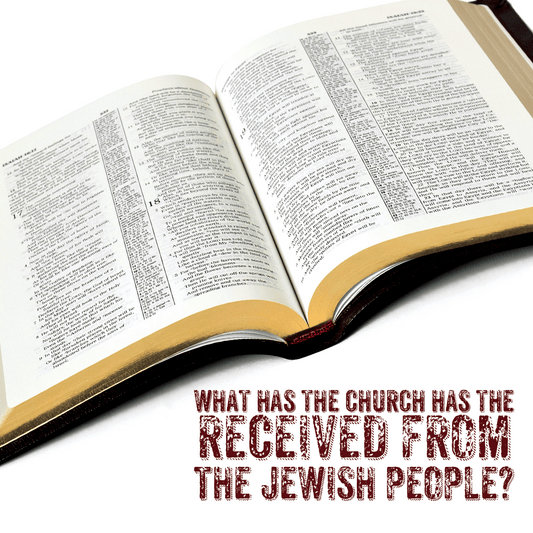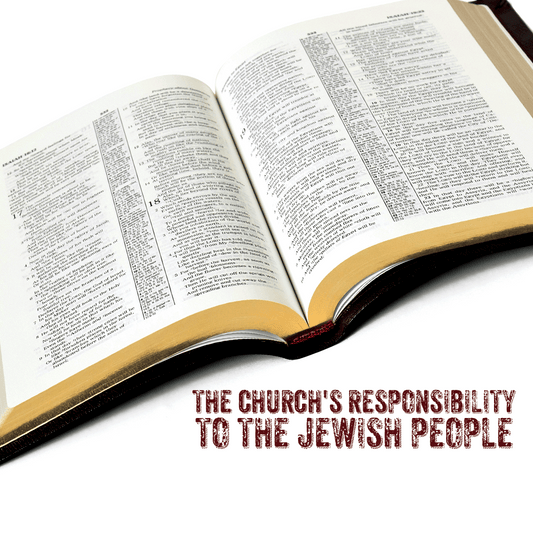WHAT IT HAS COST THE CHURCH TO WITHHOLD THE GOSPEL FROM THE JEWS
By the fourth century, Jewish evangelism effectively ceased. When Jewish evangelism ceased, the number of Jewish believers began to dwindle until they eventually disappeared from church history. Only in the 1800s did the number of Jewish believers begin increasing again at a somewhat rapid rate, comparatively speaking.
But the failure of the Church to share the gospel with the Jews has led to four major problems: the Church has lost her balance, the Church has lost her blessings from God, the Church has lost her doctrinal unity, and the Church has lost her doctrinal purity.
A. The Church has Lost her Balance
Ephesians 2:11–16 not only teaches that the Church has received spiritual blessings from the Jews, but it also deals with the concept of the one new man, the Church. Paul points out that this one new man is composed of both Jewish believers and Gentile believers in verse 15. For the Church to keep her balance, it needed both Jewish believers and Gentile believers united into one body.
However, because of the failure to proclaim the gospel to the Jews, the Church has lost her balance; many of our church splits and doctrinal problems have arisen because there were no Jewish believers in the Church to provide a corrective measure.
B. The Church has Lost her Blessings from God
The second thing the Church has lost by withholding the gospel from the Jews is her blessings from God.
1. The Principle of the Covenant—Genesis 12:3
I will bless them that bless you, and him that curses you will I curse.
One of the ways one can curse the Jews is by withholding the gospel from them. Those who take a stand against Jewish evangelism, and even worse, those who fail to practice it, are automatically depriving themselves and the Church of blessings from God.
2. The Outworking of the Covenant
Withholding the gospel from the Jews was a way of boasting over the Jews, the broken branches. This is something that Paul warned against in Romans 11:13–29, when he warned the Gentile world, the wild olive branches, not to boast against the natural, Jewish branches, which were broken off. But when Gentile believers took a haughty attitude, saying, “The Jews are beyond salvation,” in essence, they began boasting over the Jewish branches.
This boasting takes on various forms. One of the major forms is in the systematic theology know as “Covenant Theology.” There are three major lines of Covenant Theology: Covenant Postmillennial, Covenant Amillennial, and Covenant Premillennial. All of these lines identify the Church as the “New Israel” to a lesser or greater degree. All of them are saying that some of the promises that God made to Israel will never be fulfilled to literal, ethnic Israel, rather, they will only be fulfilled to the Church. Covenant Theology, which has appropriated the Jewish blessings for itself while leaving the Jews with the curses, is guilty of boasting over the branches, and that is exactly what the Book of Romans as a whole argues against.
The Book of Romans, the first systematic theology, contains the themes of biblical faith in doctrine and practice. In the first eight chapters, Paul deals with the theology of God’s righteousness. He points out that the righteousness of God has been revealed against all the unrighteousness of men, and that all men, Jews and Gentiles alike, have failed to attain God’s righteousness. Because man, on his own, cannot attain the righteousness of God, God took the step of providing righteousness for man by means of His Son.
There are three facets of God’s righteousness in the work of salvation. The past aspect is justification; once a person has become a believer in the Messiahship of Yeshua, he is once-and-for-all justified from sin. The present facet of the salvation of God’s righteousness is sanctification; the Holy Spirit is now indwelling us, slowly conforming us more and more to the image of the Son of God. The future facet of God’s salvation is glorification; we shall some day be glorified, and we shall be like Him. This is the theology of God’s righteousness.
In light of the theology of God’s righteousness in chapters 1–8, Paul then deals with the practice of God’s righteousness in chapters 12–16. The question is, “Okay, so what difference does that make?” He shows how one should work out God’s righteousness in a day to day experience. That is the reason the Book of Romans is the great book of both the doctrine and the practice of God’s righteousness.
Between the theology of God’s righteousness in chapters 1–8, and the practice of God’s righteousness in chapters 12–16, Paul deals with the issue of Israel and how God’s righteousness works its way out in His dealings with Israel, past, present, and future in chapters 9–11. Concerning the past, Israel’s rejection of the Messiahship of Jesus did not catch God by surprise in chapter 9; it was very much part of the divine plan. Concerning the present, God is not dealing with Jews nationally, but with individual Jews so that whosoever, Jew or Gentile, calls upon the name of the Lord shall be saved in chapter 10. Then, he deals with both the present and future in chapter 11. In the present, even today, there is a Remnant among the Jews according to the election of grace. There are Jewish people individually coming to saving faith, and these become the Remnant of Israel, the true Israel of God. Concerning the future, the day is coming that, when the fullness of the Gentiles comes in, all Israel will be saved. So Paul deals with the theology of Israel or Israelology between his discussion of the theology of God’s righteousness and the practice of God’s righteousness.
3. The Center of One’s Theology
The point is clear: the Jew must be the center of one’s theology. This is the exact area where Covenant Theology has failed. Dispensationalism fulfills this biblical demand. Covenant Theology fails to fulfill this demand because of its consistent confusion between Israel and the Church.
Because of the role of Israel in Dispensational Theology, there is a sense of urgency in the realm of Jewish evangelism. That is why, even today, most Jewish missions in this country are being supported by dispensational churches, rather than by Covenant Theology churches. Their attitude toward Jewish evangelism becomes a standard of judgment upon their theology: for by their fruits ye shall know them. Covenant Theology fails to take Israel into consideration because of their confusion between Israel and the Church; for them, the Church is the whole “bag” of God’s program.
A theology of any kind that leads to a failure to proclaim the gospel to the Jewish people shows them to be guilty of boasting over the broken branches. Those who boast over the broken branches are failing to receive certain blessings from God.
C. The Church has Lost her Doctrinal Unity
The third thing the Church has lost is her doctrinal unity. The many churches have split over issues that might have been alleviated simply by having the Jewish perspective.
1. The Issue of Baptism
For example, the Church has split over the issue of baptism in two ways. One way is the mode of baptism: Is baptism by immersion or by sprinkling or by pouring? The answer is: Only by immersion. It should be kept in mind that baptism was a Jewish practice long before it was a church practice. If there were Jewish believers in the congregation of whom they could ask, “How did Jews practice baptism?” they could answer, “We always practiced it by means of immersion.” Furthermore, what about infant baptism? Jews do not immerse infants. Immersion is for those who are old enough to make a decision.
Baptism is one major area the Church has split over and lost her doctrinal unity, an issue that might have been resolved if the Jewish believers had not disappeared from the church.
2. The Issue of Communion
A second example is the issue of communion or the Lord’s Supper. Churches have split over the issue of transubstantiation or consubstantiation. But they could have asked the Jewish believer, “What is the meaning of communion?” He could point out that this was simply part of the Passover, and that Yeshua took the two major elements of the Passover, the bread and the cup, and identified those two elements with His body and His blood.
The key word in the Passover is “remembrance.” That is what Jesus emphasized: to do this in remembrance of Him. This is the meaning of the Lord’s Supper; there is no such thing as the bread or the wine changing into the body or blood of the Messiah.
3. The Teaching of Amillennialism
A third example of how the Church has lost her doctrinal unity is the teaching of Amillennialism that says that while, Messiah will some day come back, He is not coming to establish any kind of literal kingdom on this earth. A Jewish believer could say, “You could not say that without endangering His Messianic credentials.” For example, if Yeshua had not been born of a virgin, He is not the Messiah, because that is part of His Messianic credentials. Or, if Jesus had not been born in Bethlehem, He is not the Messiah, because that is part of His Messianic credentials. Or, if Yeshua had not died the way it is described in Psalm 22 and Isaiah 53, then He is not the Messiah, because that is part of His Messianic credentials. By the same token, if Jesus is not coming for the purpose of establishing a literal kingdom on this earth, then, once again, He is not the Messiah, pure and simple, because that, too, is part of His Messianic credentials.
4. The Issues of Legalism
A fourth example of how the Church as lost her doctrinal unity is the issues of legalism. Churches have split over such issues as what part of the Law to keep or not to keep, what constitutes the Sabbath, as well as wine drinking and dancing. Again, nobody asked a Jewish believer, “What do these things mean in the Jewish frame of reference in which the Bible was written?”
D. The Church has Lost her Doctrinal Purity
The fourth thing that the Church has lost because she withheld the gospel from the Jews is her doctrinal purity.
1. By False Doctrines
One way that the Church has lost her doctrinal purity is by false doctrines such as that of Catholicism, which brought in the issue of images and began the practice of bowing down and “crossing” themselves before statues of Yeshua, of Mary, of Joseph, and the saints. Because they had withheld the gospel long enough for the Jews to disappear from the Church, Gentiles saw no problem with bringing in these images and bowing to them. No Jewish believer would ever have allowed for that kind of debasement of God’s truth. The problem of Catholicism and all of the false teachings that came with it could have been avoided if there were Jewish believers in the Church.
2. Through Liberalism
Another way that the Church has lost her doctrinal purity is through liberalism. Liberalism began spreading in the churches at the turn of the twentieth century as ministers began denying such fundamental doctrines as the Virgin Birth, the inspiration of Scripture, and the literal Resurrection of Jesus. But again, this was because there were no longer Jews in the Church to put a cap on these kinds of false teachings. If a minister had stood in the pulpit and said that Yeshua was not born of a virgin, a Jewish believer would not accept it, because that is part of His Messianic credentials. If he had denied that Jesus rose from the dead, no Jewish believer could accept it because that, too, is part of His Messianic credentials. Furthermore, if he began to deny the inspiration of Scriptures, a Jewish believer who holds the Scriptures dearly and who knows that much Jewish blood was shed over the preservation of the Scriptures simply could not stand for that. And so the Church has also lost her doctrinal purity by withholding the gospel from the Jewish people.
Excerpt from Dr Arnold Fruchtenbaum:
MBS179 THE CHURCH AND THE JEWS: Pg 8-13





